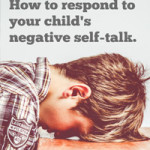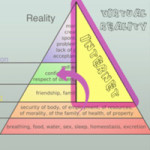At Palmy Boys’
When boys are young they often follow their fathers around, asking endless questions and trying to be “just like Dad”. But as boys get older, much can go unsaid — especially when it comes to struggles and challenges in their lives…… read more.
When negative self-talk spews from your child’s mouth, your knee-jerk reaction is to stop it. To give your child some reassurance or to convince them that their thinking is flawed. Unfortunately, their words may match their feelings. They do not feel “loveable” or “wonderful” (as you may suggest), they feel “dumb,” “stupid,” and “like the worst kid in the world.” Instead of moving in to fix it, try these ideas to address the underlying feeling and their internal struggle….. read more.
Common Ground aims to ensure that parents, families, whānau and friends of young people have easy access to information that will help them support young people to manage hard times and enjoy positive mental health and wellbeing…. read more.
ReachOut helps under 25s with everyday questions through to touch times. ReachOut is an Australian based website that provides a range of practical and useful wellbeing resources for young people and parents… read more.
Most people feel miserable now and then, often when something upsetting or stressful is happening such as a relationship break-up, or losing a job. Feeling down in response to difficult situations is pretty normal, and usually the feelings fade over time and you get on with life. But when the feelings of unhappiness are intense and persistent – and they don’t go away even when things improve – this could be depression. The medical term for this is ‘major depressive disorder’…. read more.
While it can be easy to be mentally strong when life is going well, your true strength becomes apparent through adversity. The loss of a loved one, a health problem, relationship issues, and financial troubles are just a few of the hardships most of us will face at one time or another….. read more.
Emotional intelligence refers to the ability of a person to manage his emotions in a healthy way and to respond appropriately to the feelings of others… read more.
Teens can’t control impulses and make rapid, smart decisions like adults can — but why? Research into how the human brain develops helps explain. In a teenager, the frontal lobe of the brain, which controls decision-making, is built but not fully insulated — so signals move slowly…. read more.
It has become a cultural cliché that raising adolescents is the most difficult part of parenting. It’s common to joke that when kids are in their teens they are sullen, uncommunicative, more interested in their phones than in their parents and generally hard to take. But this negative trope about adolescents misses the incredible opportunity to positively shape a kid’s brain and future life course during this period of development…. read more.
Why do teenagers seem so much more impulsive, so much less self-aware than grown-ups? Cognitive neuroscientist Sarah-Jayne Blakemore compares the prefrontal cortex in adolescents to that of adults, to show us how typically “teenage” behavior is caused by the growing and developing brain…… read more.
Siegel illuminates how brain development impacts teenagers’ behavior and relationships. Drawing on important new research in the field of interpersonal neurobiology, he explores exciting ways in which understanding how the teenage brain functions can help parents make what is in fact an incredibly positive period of growth, change, and experimentation in their children’s lives less lonely and distressing on both sides of the generational divide…. read more.
Staying healthy as a man requires more than just picking stuff up and putting stuff down… read more.
Harmful digital communication can take many forms. Learn more about the new Act and how to deal with online harassment… read more.
Researchers find people who meet friends and family at least three times a week far less like to have depression than those who have only ‘virtual contact’… read more.
Children can’t resist the pull of electronic devices, and parents don’t know what to do about it. Sound familiar? The average child spends more time consuming electronic media than going to school, with many teenagers going online “almost constantly.” And parents aren’t necessarily being good role models. A British study showed that while six in 10 parents worried that their children spend too much time in front of a screen, seven in 10 children worry that their parents are the ones who are plugged in and tuned out…… read more.
A unique award-winning computer program that helps young people learn skills to deal with feeling down, depressed or stressed….. read more.
How virtual reality has made social isolation more seductive than ever before… read more.
There’s an ongoing sleep study that is of great interest to me, and I expect to many others as well: For the first time, scientists will be examining the effects of mobile phone emissions on sleep and brain activity in children and teenagers. Researchers recently began this study at Illawarra Health and Medical Research Institute at Australia’s University of Wollongong. The research investigates the effects of RF EMF (radiofrequency electromagnetic field) exposure from mobile phones on the sleep, brain patterns, and cognitive function of youth ages 10-18….. read more.
A new study is the first of its kind to link nighttime instant messaging habits of American teenagers to sleep health and school performance. Media use among children of all ages is increasing exponentially; studies have found that children ages 8 to 18 use electronic devices approximately seven-and-a-half hours daily…. read more.
Far better than counting sheep, these talks on the importance of sleep may well help you get your zzzzs tonight…. read more.
There’s no shortage of research around the benefits of sleep and its critical relationship to learning. So how much sleep is enough? Researchers have looked at the differences in cognitive function of people who have slept four or six or eight hours and how their brains function. This AsapSCIENCE video demonstrates what your capabilities are after those various amounts of sleep…. read more.
Screen time is an inescapable reality of modern childhood, with kids of every age spending hours upon hours in front of iPads, smartphones and televisions. That’s not always a bad thing: Educational apps and TV shows are great ways for children to sharpen their developing brains and hone their communication skills—not to mention the break these gadgets provide harried parents. But tread carefully: A number of troubling studies connect delayed cognitive development in kids with extended exposure to electronic media. ….. read more.
When we see a loved one faced with fear and crippling anxiety, our first instinct is to step in and save them. Tackling anxiety however requires facing fear and learning to cope – bit by bit. Professor Jennie Hudson outlines simple strategies to help children slowly face fear and improve emotional health into adulthood…… read more.
A film devoted to developing who we are and who we want to be in the world….. read more.
























